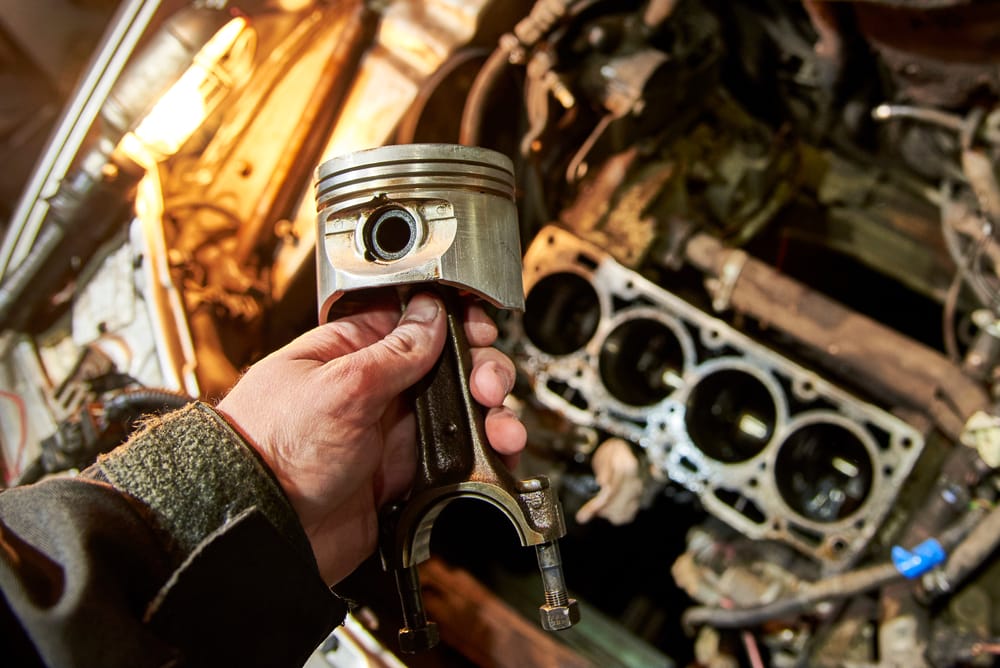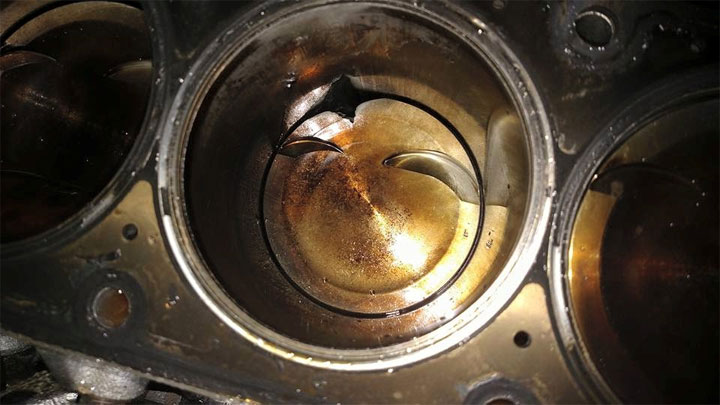
Low compression in all cylinders would tell you the rings and cylinders are worn and the engine needs to be overhauled. First off check to see if you didnt happen to get the 2 and 3 spark plug wires mixed up when you changed the wires.

Internal engine damage exists such as.
What does no compression in one cylinder mean. If there happens to be no compression in one cylinder you may face a severe challenge with running your cars engine smoothly as it would misfire among other symptoms. Therefore you need to look out for a blown head gasket and any other factor that could cause any of your cars cylinders to experience no compression and the best possible way to fix the issue. What does no compression on a cylinder mean.
No compression in all cylinders is also caused by a broken timing belt or a broken camshaft while low compression in all cylinders can be traced to damaged piston rings. A dropped valve seat damaged valve spring a damaged valve and a dropped valve can all lead to no compression in one cylinder. Low compression will mean less ignition which will cause you misfires.
The following is a list of what may be causing your engine to lose compression. The Cylinder Wall may be Cracked. Also called the cylinder block usually cracks when there is excessive heat.
With the cylinder wall cracked the compression can be affected. I got 100 on first cylinder closest to the fan 95 on second 90 on third and 0 on the fourth closest to steering wheel. I then pull the tester from the cylinder 4th cylinder and noticed that the value appears to be stuck open and does not go up and down when the engine cranks like the other cylinders but there is little puffs of air which seems to suggest to me that the cylinder is.
No compression means very little compression. Did they do a compression check. Or was that a guess.
First off check to see if you didnt happen to get the 2 and 3 spark plug wires mixed up when you changed the wires. I would also check and see if you have some stuck valves. If there really is no compression that would probably be.
Low Engine Compression In One Cylinder. If readings are very low in one cylinder it is highly probable that. Internal engine damage exists such as.
The piston could have a broken connecting rod or a hole in it. There could be a stuck burnt or leaking valve. There could be a broken valve spring or a bent push rod.
Low compression in one cylinder usually indicates a bad exhaust valve. Low compression in two adjacent cylinders typically means you have a bad head gasket. Low compression in all cylinders would tell you the rings and cylinders are worn and the engine needs to be overhauled.
What is the measured compression on that cylinder. No compression would indicate zero psi and that is unlikely unless the piston has the top blown out or one of the valves is held open significantly. Answer 1 of 12.
It would depend on why there is no compression on that cylinder some of the reasons are below and whether you should continue driving. Damaged exhaust valve - ok to drive as although unburnt fuel will pass into the exhaust it should get you home. Damaged piston this coul.
Cylinder 2 has no compression due to the valve spring not shutting. If the valve spring is broke it can be replaced without removing the cylinder head. The labor guide shows 8 hours labor to replace the valve springs or valve seals on one bank they may charge less to replace just one valve spring.
If you have low compression in all cylinders this is often the culprit. Also your compression leak may not be in the pistons or head gasket but in the valves. Exhaust valves and air intake valves at the top of the cylinder can also get overheated and leak gas or the valve seals can become too worn to seal the gas in properly.
If no compression is present in any one cylinder it means a mechanical malfunction has occurred while low compression could just be the sign of worn internal engine parts. Checking compression is done using a simple compression gauge and can be done in about 45 minutes in most cases. What causes no compression in only one cylinder white smoke in exhaust with water and oil under tailpipe.
No compression could mean a blown head gasket cracked head or cylinder. Low Engine Compression In One Cylinder If readings are very low in one cylinder it is highly probable that. Internal engine damage exists such as.
The piston could have a broken connecting rod or a hole in it. There could be a stuck burnt or leaking valve. What does it mean when compression reading does not change.
If the compression readings do not change then it would indicate. What means if engine cylinder compression rate is zero. If playback doesnt begin shortly try restarting your device.
Videos you watch may be added to the TVs watch history. No compression on one side is probably the cause of your problem not the coil. Im betting a blown head gasket.
Here is a service manual which may help but I caution that installing a head gasket on a Kawasaki with having done it before can lead to danger. They do things a bit differently. This is a classic sign of low compression in one or some cylinders.
If air in the combustion chamber is not being compressed enough only a fraction of the engine power needed can be produced. However no compression means there has been more of a catastrophic engine failure broken camshaft hole in a piston broken piston connecting rod dropped valve. These types of failures generally require a full engine overhaul including pulling the engine from the frame and potentially separating the bottom end to retrieve fragments of parts.
A number of things can cause an engine to lose compression and just about all of them involve mechanical failure of some kind. Either the engine is out of time as described above or there are bent or broken internal parts that bleed off compression. So bent valves a hole in the top of the piston or broken piston rings can cause a loss of.
Air coming out the spark plug hole does not mean you have compression. If the rings are worn or the valve is bad you can not take advantage of the compression of the explosion in the cylinder. It will blow by the rings or the valve and give you little or no power in that cylinder.
As a rule most engines should have 140 to 160 lbs. Of cranking compression with no more than 10 per cent difference between any of the cylinders. Low compression in one cylinder usually indicates a bad exhaust valve.
Low compression in two adjacent cylinders typically means you have a bad head gasket. In order for you to drive around in your car without experiencing any issues you obviously need it to be firing on all cylinders so to speak. But if there is an issue with the compression in your cars engine there is a chance that you might find yourself driving with low compression in one cylinder.